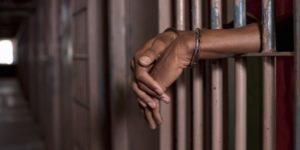Correctional services centres across South Africa have 172 confirmed cases of COVID-19, with three deaths and 59 recoveries.
A total of 95 officials have tested positive for COVID-19, with 77 inmates also being affected by the virus.
“Currently, our COVID-19 preventative measures are stretched to the brink.We have managed thus far, but the spread of the virus continues. We ought to act decisively and prevent this invisible killer from rapidly multiplying in our centres,” Minister of Justice and Correctional Services Ronald Lamola said.
The Minister was on Friday briefing members of the media in Tshwane on the Special COVID-19 Parole Dispensation following the President’s authorisation for the placement of about 19 000 inmates on parole.
The President approved the placement of selected categories of sentenced offenders on parole as a measure to combat the spread of COVID-19 in correctional facilities, which are considered high-risk areas of infection.
“This was in accordance with Section 84(2) (j) of the Constitution which gives the President the responsibility for pardoning or reprieving offenders and remitting any fines, penalties or forfeitures.
“In addition, Section 82 (1)(a) of the Correctional Services Act also empowers the President to at any given time, authorise the placement on correctional supervision or parole for any sentenced offender, subject to conditions that may be recommended by the Correctional Supervision and Parole Board,” the Minister said.
The COVID-19 parole dispensation excludes inmates who were serving sentences for sexual offences, child abuse, murder, attempted murder, armed robbery, sedition, high treason, sabotage and terrorism.
It also excludes offenders sentenced to life imprisonment, violations under the Domestic Violence Act, 1998(Act No 116 of 1998), any escaped/absconded inmate who evaded the justice system after being released on bail pending appearance and was still at large on 16 December 2019, those certified as mentally ill and detained in accordance with the Mental Health Act of 2002 (Act 17 of 2002).
The Minister said the placement on parole will be a decision of the parole boards, the President’s decision only allows that these low risk offenders be considered for parole by the parole boards.
“It will be done in phases and the most vulnerable, such as those with underlying health problems, elderly (aged above 60 years) and female offenders with infants, will be prioritised.
“Approximately 19 000 inmates across the country will benefit from this decision provided they meet requirements of the parole board,” the Minister said.
They will be considered on a case by case basis and those who qualify will be placed on parole after all the due processes, including victim offender dialogues, have accordingly unfolded.
“This process will also include a comprehensive screening process for inmates including but not limited to, taking of their finger prints and DNA samples by the South African Police Services and soliciting inputs from departmental social workers and criminologists, which is a critical criteria for placement on parole,” Lamola said.
Once completed, this process is expected to reduce overcrowding by 12.15% should those considered for parole by the boards be granted parole.
“This reduction will be important from a clinical perspective as overcrowding affects the quality of oxygen circulation within cells and this contributes to the speedy spread of the virus thereof. The Department of Correctional Services will implement further preventative measures to safeguard those remaining under our care,” the Minister said.
South Africa still has a high percentage of overcrowding which currently stands at 32.58% as of 04 May 2020.
“We have a total of 157 208 inmates, whereas our accommodation capacity is 118 572. This number includes a total of 56 536 inmates who are in remand detention. This means our accommodation capacity is exceeded by 38 636 inmates,” Lamola said.
The Eastern Cape has a highest prevalence of overcrowding at 54.88%, Gauteng follows with 52.10%, Limpopo, Mpumalanga and North West region stand at 39.18%, Western Cape stands at 29.08%, KwaZulu-Natal stands at 25.97% and Free State and Northern Cape region is at 0.45%.
“One of our mitigation factors to alleviate overcrowding was construction of new infrastructure and upgrading of old infrastructure to increase bed space. In 2015, we upgraded Ceres Centre, Western Cape, resulting in 282 additional beds,” the Minister said.
In 2017, government upgraded Matatiele in KwaZulu-Natal and Vanrhynsdorp in Western Cape, resulting in additional 352 beds.
In 2018, the Standerton Centre in Limpopo, Mpumalanga and North West Region were upgraded, resulting in 604 additional beds.
In 2019, upgrades were done in Estcourt in KwaZulu-Natal resulting in additional 309 beds. In 2020, C Max in Kgosi Mampuru was upgraded resulting in 12 additional beds.
“In the next five years, we will create additional 3 006 bed spaces through upgrades and construction of new facilities in Emthonjeni, Brandvlei, Parys, Burgersdorp and Lichtenburg.
“Experience has taught us that it is not possible for our infrastructure projects to outpace the rate of conviction due to our high crime rate in our country,” the Minister said.
SAnews.gov.za
 Home Of Ghana News Ghana News, Entertainment And More
Home Of Ghana News Ghana News, Entertainment And More




